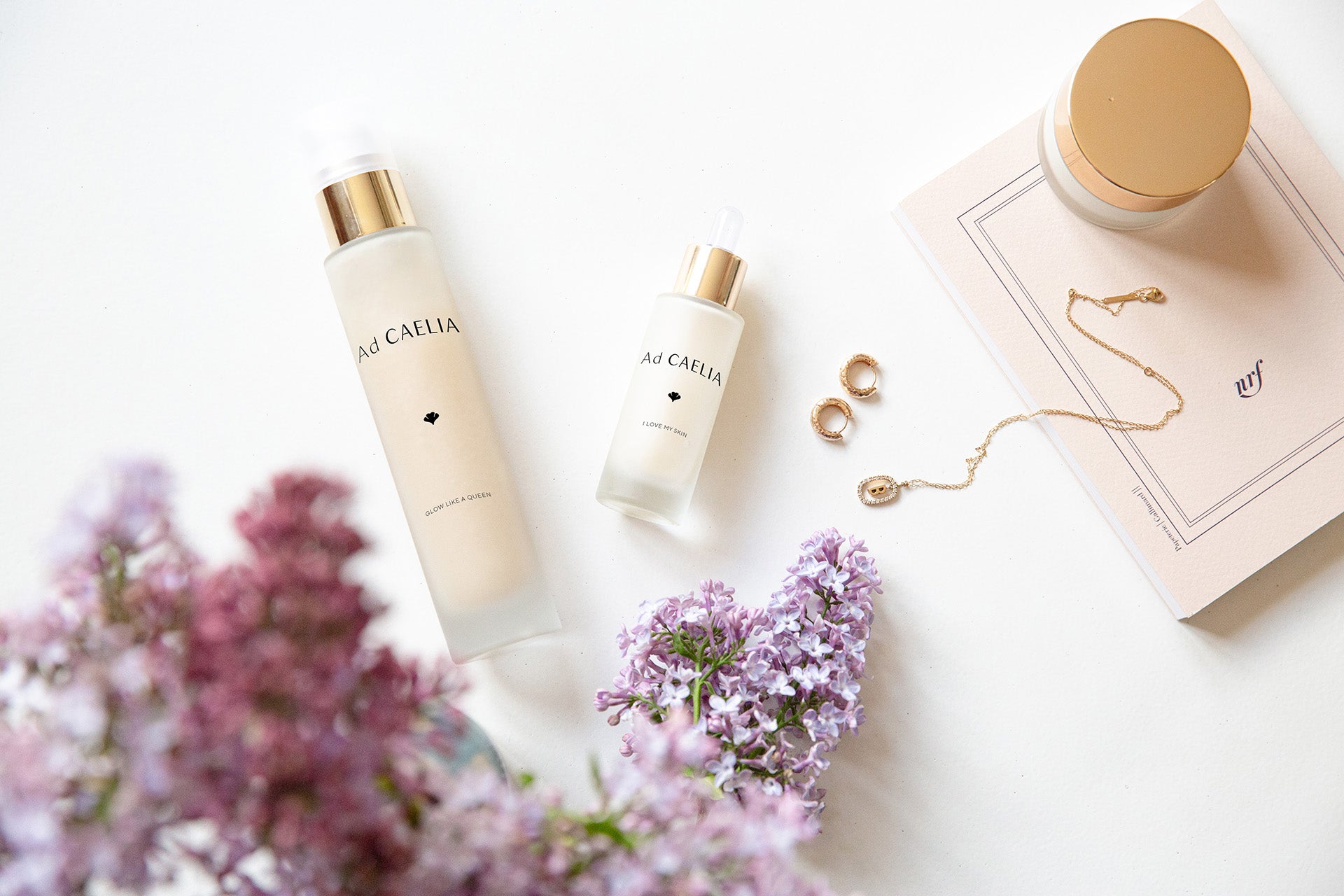
Understanding female balance
Let's talk about hormones.
We often neglect them, yet hormones are of central importance for our vitality and overall beauty. Indeed, they regulate absolutely everything in the organism and therefore influence our physical and mental state day after day.
Today, we wanted to give you keys to better live your cycle and learn to adapt your life according to the fluctuations of natural hormones. It is already necessary to understand that over the course of a cycle (about a month), we experience 4 different phases: menstrual, follicular, ovulation, luteal. During these phases, we therefore undergo normal hormonal fluctuations that notably influence body temperature, sleep cycle, energy, emotion, and brain functions.
If we do not live in synchronization with these phases, our hormones become more or less deregulated, and we suffer the repeated and often totally unnecessary frustration of experiencing symptoms such as bloating, fatigue, PMS, and much more.
To find hormonal balance, it is therefore in our best interest to live in synchronization with our cycle, which means adapting our diet, our physical activity, and certain habits and practices, to each phase.
Below you will find a presentation of the four cycles so that you can start to plan, eat, and live in harmony with your hormones. Let's start with phase 1 and 2 and next week phase 3 and 4!
Phase 1: Menstruation (3 to 7 days)
- Energy: The first day of our cycle corresponds to the first day of menstruation. At the beginning of the cycle, our hormones are at their lowest levels, as they act to shed the uterine lining. Due to this hormonal decline, energy levels are likely to be low. So take this time to relax, take care of yourself, and slow down, and trust your intuition which will ask for rest. Plan time for yourself and pamper yourself. Don't be afraid to ask for help and delegate during this period. Naps can also be very salvaging during this period, so yes, if you have the time, it's perfectly acceptable! And it will help with proper elimination and overall hormonal balance. Your strengths during these days are evaluation and intuition.
- Physical activity: Stop high-intensity activities, it's not the time to push yourself to the limit, but rather to favor gentle practices.
- Activities to favor: Walking, gentle or yin yoga, breath work, stretching.
- Diet: Think "relaxation and comforting healthy food". Support the body with lots of filtered water, unprocessed foods, and especially micronutrient-rich foods to maintain energy levels. A good mix of quality lean proteins (!), healthy fats, and low GI carbohydrates, like root vegetables, gluten-free whole grain stews, and legumes, can support the menstruation process which consumes a lot of energy. Think about remineralizing your body with iron and zinc, which you lose during this phase of your cycle, with foods like lentils, seaweed tartars and dried seaweeds, fish and seafood, pumpkin seeds, prunes, and spinach. If you eat meat, beef and eggs are also a good source of heme iron, but be careful: it would be important to consume organic quality and in small quantity – quality changes everything for assimilation and internal chemistry. If possible, include fermented and sprouted foods, they are easier to digest, and bring a lot of vitality with a good dose of essential nutrients. This is an important time to make healthier food choices and promote the body's natural purification.
Foods to favor
- Seaweeds
- Sweet potato
- Whole rice or black rice for example
- Pumpkin seeds
- Quality and preferably gluten-free whole grains to promote good digestion and reduce inflammation
- Fresh wheat germ
- Sprouted seeds
- Hazelnuts
- Quality proteins, especially fish and seafood, poultry, lentils, fish, eggs, tofu (organic or wild for fish).
Supplements
- Magnesium: against cramps and migraines, for good stress management (and skin)
- B vitamins in complex: for breast sensitivity, coagulation cramps, and migraines (and skin)
- Chasteberry (Agnus Castus): A powerful antispasmodic, chasteberry regulates the female cycle and helps fight symptoms related to PMS
And some essential oils that can relieve
- Lemongrass EO: vasodilator, powerful anti-inflammatory, and lymphatic drainer
- Lentisk pistachio EO: venous and lymphatic decongestant, particularly at the level of the small pelvis
- Lavandin super EO: powerful muscle relaxant, calming and sedative
- Apply a few drops morning and evening on the lower abdomen, by gentle massage in the direction of the clock, in the second part of the cycle. Either a single oil or the synergy of the 3 in a little vegetable oil like sweet almond or calendula.
Phase 2: Follicular (7 to 10 days)
- Energy: Hormone levels, although still low, begin to rise as the egg follicles mature in preparation for ovulation. You start to have more energy. With the increase in estrogen, some women quickly feel more energy, improved concentration, and greater motivation. Your creativity is high during this phase as well, so it's the time to brainstorm, prepare, plan, and launch your projects, as well as nurture your social life!
- Physical activity: As you regain energy, gradually reintroduce more dynamic physical exercise. It's a good time to go out, have fun, and try something new.
- Recommended activities: running, cycling, dancing, hiking, and jump rope.
- Nutrition: During this period, focus on light and ""energizing"" foods. Salads and fermented foods like juice or lacto-fermented vegetables are good choices to promote gut health and detoxification. With increased motivation, it might also be the perfect time to start eating healthier or embark on a seven-day plant-based cleanse.
Foods to prioritize
- Mixed salads with raw/cooked vegetables
- Ground flax seeds
- Avocado
- Broccoli
- Nuts/seeds mix
- Zucchini
- Buckwheat
- Sardines
- Salmon (organic or wild-caught)
Supplements
- Probiotics: a daily support for digestion, detoxification, immunity, and mood.
- Shatavari root: known for its immune support and sexual health benefits, often used for premenstrual syndromes (as well as menopause-related issues). It can be consumed in powder form in smoothies or compotes, for example.
- Also consider L-theanine, lemon balm, or ashwagandha: if your increased energy turns into restlessness, try one of these remedies in a short course.
Phase 3: Ovulation (3 to 5 days)
- Energy: Once the egg has matured, we enter the ovulation phase. Hormone levels increase, especially estrogen, which facilitates the ovulation process. Our basal body temperature also rises, which can impact increased energy levels. We are naturally more communicative and sociable during this period, making it a good time to communicate and connect with those around you. Any type of presentation, negotiation, or teamwork becomes easier during this phase.
- Physical activity: This is the part of your cycle when you have the most energy, so make the most of it! Engage in higher-intensity physical activities – consider Vinyasa or Bikram yoga, HIIT workouts, or go for a brisk morning run...
- Nutrition: Fiber-rich and light. Excess estrogen can have a negative impact on the cycle, including breast sensitivity. It's a good time to load up on raw vegetables and fruits to add fiber to ensure proper metabolism and the elimination of any excess estrogen. During this phase, prioritize gluten-free pseudo-cereals, which are more digestible and nutritious, such as millet, buckwheat, quinoa, or in small quantities, organic whole grains rich in vitamin B.
Foods to prioritize
- Buckwheat/Millet/Quinoa/Amaranth/Whole rice
- Eggs (organic)
- Red lentils
- Almonds, pecans
- Vegetables: kale, radishes, spinach, eggplant, dandelion greens, endives, tomatoes, asparagus...
- Fruits: berries, coconut, figs, persimmons, apricots...
Supplementation
- Vitamin B6: promotes energy production, mood, and hormonal regulation throughout the month (ideally take a B-complex, as mentioned in the previous article).
- Glutathione (powerful antioxidant) optionally to effectively support the liver and the first phase of detoxification.
- Herbal infusions for balance, relaxation, and/or digestion. Calming herbs include valerian, orange blossom, lavender, and chamomile. Digestive herbs include fennel, mint, lavender, and chamomile.
Phase 4: Luteal (10 to 14 days)
- Energy: Hormone levels reach their peak concentration at the beginning of this phase. During the first part of this phase, continue to socialize and spend time with others. As you enter the second part, start to focus more on yourself... It's a good time to work on projects alone, accomplish tasks, get organized, and reconnect with yourself and your own needs.
- Physical activity: In the first part of this phase, you will still feel full of energy, so you can continue with slightly more intense workouts. However, when you transition to the second part, start lowering the intensity of your sessions. Turn to gentler, low-impact activities like gentle or yin yoga, Pilates, walking, or cycling.
- Nutrition: Balanced plate. Premenstrual syndrome (PMS) is most common in women during this period, but it doesn't have to involve these various discomforts! Most of these symptoms are directly related to a lifestyle that does not sufficiently respect the body's needs and hormonal balance. It is possible to soothe and even get rid of PMS symptoms through food choices and relaxation of the nervous system! If you notice water retention, especially in the form of swollen breasts and bloating, avoid salty foods, which can worsen the problem due to their anti-diuretic effects. Opt for green vegetables rich in calcium and magnesium to alleviate these fluid retention symptoms. The same applies to sugar; if you tend to have cravings, they can peak during this week, and carbohydrates can be very tempting. Try at least to choose complex versions, like whole rice, lentil-based pasta, or organic whole sourdough bread (providing B vitamins and fiber to help regulate blood sugar and reduce sugar cravings). It is also important to reduce caffeine and alcohol, as these stimulants can worsen anxiety and mood swings associated with PMS. Coffee and alcohol also interfere with the absorption of essential vitamins and minerals necessary for optimal menstrual (and overall!) health. So, try healthier alternatives like homemade sparkling fruit water (water with your favorite fruits or floral waters), herbal teas, chicory root, a small amount of matcha, or green/white tea (stimulating but gentler than coffee). Continue to consume plenty of fiber to help the body eliminate excess estrogen.
Foods to prioritize
- Vegetables: Cauliflower, spinach, celery, cucumber, garlic, zucchini, onions, pumpkin, sweet potatoes,
- Fruits: Berries, apples, dates, pears, peaches, grapes
- Sesame seeds
- Whole rice, millet
- Nuts, pine nuts
- Protein choices: tofu, chicken, lean meats, fish and seafood, chickpeas
- Turmeric/ginger (make a golden latte!)
- Organic dark chocolate min 75%
- Relaxing/digestive herbal infusions
Supplements
- Chromium and L-glutamine: used in insulin regulation of blood sugar and to improve intestinal health (closely related to hormonal and nervous balance).
- Ashwagandha: known for its ability to help the body adapt to stress and also a great overall balancer.
- Magnesium: for anxiety, tension, promoting sleep (often deficient), and skin health.
- Omega-3: hormonal, nervous, glycemic balance, optimizing sleep/stress management/skin.

We hope you have enjoyed this detailed overview of each of the 4 phases. Above all, it's important to listen to your body throughout the month. By tuning into your body, you will naturally notice your periods of lower energy compared to when you are full of energy, and this will guide you in how to plan your workouts, your diet, and your days. This personal guidance in alignment with our innate needs will truly change your life because it will first stabilize your energy levels and your mood. You will suffer less from unpleasant and sometimes even painful fluctuations. Sometimes we believe that these fluctuations are natural simply because we've been accustomed to living with complicated cycles for a long time. It's not natural to suffer due to our cycle, and we can address it through our lifestyle choices.
Now, let's head to the kitchen and prepare balanced and supportive meals for our hormones, so we can live better starting today! "


Leave a comment
This site is protected by hCaptcha and the hCaptcha Privacy Policy and Terms of Service apply.